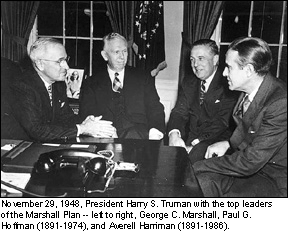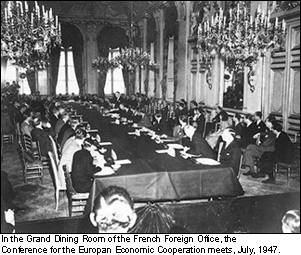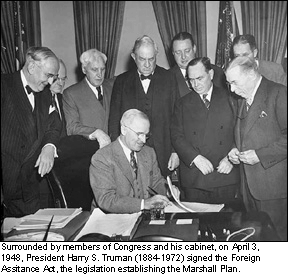|
|
European Recovery Programme
|

|
|
As in developing nations today, Europe faced desperate economic conditions in the years following the Second World War, including severe food and fuel shortages, poverty, unemployment, a lack of capital, unstable currencies, and balance-of-payments deficits. The worsening crisis in the postwar European market imperiled international peace and political stability, and posed a threat to American trade as well. |
|
| In a speech at Harvard University on June 5, 1947, United States Secretary of State George C. Marshall announced the broad outlines of a European Recovery Program. One month later, the nations of Western Europe specified the details of that plan at the Paris Economic Conference, and President Truman submitted the program to the US Congress on December 19. The Senate passed the bill on March 13, 1948, the House approved it on March 31, and on April 3, 1948, President Truman signed it into law. |
| |

|
| |
| Sixteen war-torn nations in Western Europe received $13.3 billion in grants and technical assistance over a four-year period. Through private charities, Americans contributed another $½ billion. The first phase of the recovery program was food relief. This was followed by the mass export to Europe of seed, fertilizer, raw materials, chemicals, and technology, as well as new training in engineering, research, and management. |
| |
| With the reconstruction of infrastructure and new production, European per capita GNP rose by 1/3 between 1948 and 1951. As productivity increased and currencies stabilized, Europeans were able to buy more foreign imports, and US exports increased dramatically. By stimulating local development, industrialization, trade, and liquidity, the Marshall Plan led to a major economic recovery and boom in both Europe and the United States, which lasted for two decades. |
|
 |
| |
|
|
|
|
|
|
|

